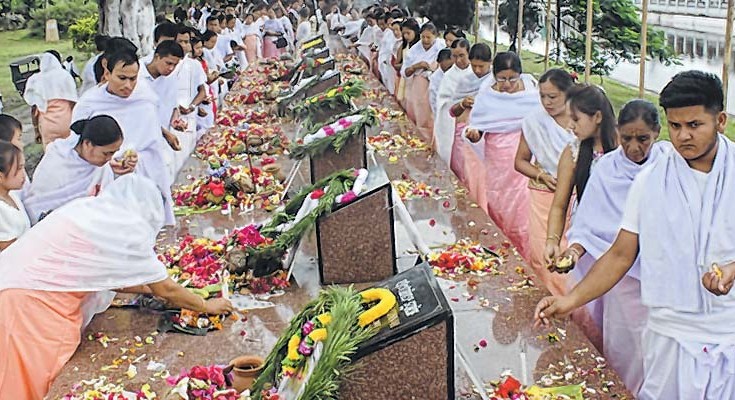IMPHAL, Jun 18: The Great June Uprising, Unity Day 2016 was observed here at Kekrupat, Kangla where thousands of people belonging to different ethnic communities and religious faiths paid rich tributes to the martyrs of the historic mass movement of June 2001.
Offering of floral tributes to the martyrs, public convention and a blood donation camp were the main features of the 15th commemorative function jointly organised by AMUCO and UCM.
The commemorative function was opened with a traditional musical prelude which was followed by rituals and prayer sessions. Then the huge gathering offered floral tributes to the memorial tombs of the 18 martyrs.
 Together with leaders of different communities and distinguished personalities, observation committee chairman Elangbam Johnson and vice-chairman Dr Y Mani Khuman presided the public convention. Family members of the martyrs were also seated on the dais.
Together with leaders of different communities and distinguished personalities, observation committee chairman Elangbam Johnson and vice-chairman Dr Y Mani Khuman presided the public convention. Family members of the martyrs were also seated on the dais.
On the other hand, a strong police team kept a strict vigil in and around Kekrupat until the commemorative function was over.
Giving the key-note address of the public convention, the 15th Great June Uprising, Unity Day 2016 Observation Committee convenor T Gandhi Meetei recalled that the cease fire agreement signed between the Government of India and NSCN-IM at Bangkok on June 14, 2001 which had the suffix ‘without territorial limits’ evoked massive, spontaneous reaction from the people of Manipur.
In the ensuing mass protest movement, 18 people achieved martyrdom.
The slogans of the historic civil movement and the booming sounds of indiscriminate fire opened to suppress the movement still reverberate in the hearts and minds of people, he said.
The historic episode clearly demonstrated that Manipuri people are ever ready to sacrifice their precious lives for the motherland, her boundary and integrity, Gandhi asserted.
Taking due note of the unparalleled significance of the event, AMUCO and UCM have been observing the Great June Uprising, Unity Day together with the people every year so that the message of the historic movement is not lost in history but carried forward to future generations.
In their efforts to appease a single militant group, the Government of India has been repeatedly challenging the territorial integrity of Manipur. In their attempts to appease NSCN-IM, New Delhi has proposed different arrangements such as ‘Alternative Arrangement’, ‘Supra State’, ‘Pan Naga Cultural Body’ etc but none of these ideas are acceptable to the people of Manipur.
Capitalising on SoO pacts signed with Meitei and Kuki militants groups, New Delhi has been allegedly conspiring consistently to create communal disharmony and animosity, he continued.
It would be an irreparable loss for all communities of Manipur if any communal conflict arises out of such demands like Greater Nagalim, Kuki State and other ethno-centric demands.
Some Kuki militant groups with whom the Government of India initiated political dialogue a few days back have raised the demand for a separate Kuki State. This indicated that they have fallen prey to the Government of India’s divisive policies.
It is an unyielding stance of the people of Manipur that any challenge to the integrity of Manipur and its territorial boundary which was carved by ‘our ancestors’ would not be tolerated, Gandhi said.
At the same time, Manipuri people are committed to peaceful co-existence of all indigenous communities.
All the indigenous people of the North East region must prepare well to face the impacts of the all pervading force of globalization and India’s Act East Policy.
Indigenous peoples are now faced with a precarious situation about possible extinction on account of incessant influx of outsiders. Yet, the Government has not taken up any effective measures to protect indigenous peoples, Gandhi decried.
Father of Social Works Th Iboyaima, UCM consultative committee members RK Ranendrajit, Ibotombi Khuman, AMUCO advisor KT Rahman, Kuki Inpi Manipur (KIM) home affairs chairman Hemjathang Khongsai, Zeliangrong Union vice–president R Chandra Haomei, Manipur State Minorities Commission Chairperson Dr Syed Burhanuddin, AMKIL president Ph Sakhi, Poirei Leimarol Meira Paibi Apunba Manipur president L Memchoubi, Kanglamei president Y Leirikleima, Kabui Mothers Association vice-president Atompui Kamei, Lumlanghupi village secretary H Mangijao, Chothe Aimol Tribe Union Manipur president RT Akhel Aimol, social worker Simon Chiru, Committee on Culture for Peace and Integrity, Assam chairman S Kamlakanta, Manipuri Sahitya Parishad Hojai general secretary Ph Manibabu and Ema Keithel Lairembi Hojai president M Shantibabu were also seated on the dais. Elangbam Johnson highlighted the need to study the chronology of events which took place since Government of India and NSCN-IM signed a cease fire agreement in 1997.
Sometimes only rhetoric and slogans are not enough to safeguard the integrity of Manipur, he observed.
Although the people of Manipur have urged the Government of India repeatedly not to touch the political boundary of Manipur, there has been no convincing response so far. Moreover, the details of the dialogue have never been divulged.
“Nonetheless, we categorically told the Government of India twice that integrity of Manipur and its boundary should not be disturbed under any circumstances”, Johnson said.
Fragmentation of Manipur based on ethnicity is never acceptable. All development programmes aimed at benefiting any particular group should not be done without taking the Government of Manipur on board. A separate administrative body will never be accepted and this was conveyed to the Government of India without leaving any room for ambiguity.
“This is the position of Manipuri people and we will not retract a single step. If any force challenges this position, there will be befitting response”, Johnson asserted.
Dr Y Mani Khuman stated that Meitei, Meitei-Pangal, Naga and Kuki are the backbones of the composite Manipuri society.
Exploration of a common cause for the four communities and consolidation of the idea of a united Manipuri Nation can bring unity, peaceful co-existence and uniform development.
Whatever gaps there are among the indigenous communities whether in terms of physical interaction or communication should be plugged in. But there are inimical forces which have mastered divisive politics and they have been scheming consistently to pull the indigenous communities of Manipur apart. They find it easier to play out their divisive politics if there is tendency of groupism within a community or between one ethnic group and another.
“Given this political scenario, we need to reconcile and explore a common path. Then we can defeat the divisive forces without much difficulty”, Dr Mani asserted.



